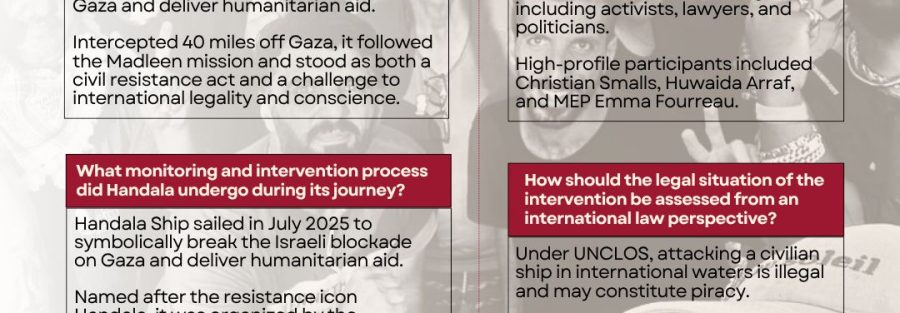In the summer of 2025, civil humanitarian efforts aimed at Gaza became the strongest expression of international collective conscience against Israel’s naval blockade. Organized by the Freedom Flotilla Coalition (FFC), the Handala ship set sail with the purpose of breaking the blockade and delivering humanitarian aid. However, it was seized by Israel when it was about 40 miles off the coast of Gaza. This event occurred approximately 1.5 months after the similar Israeli intervention against the Madleen ship, which also set sail in the Mediterranean with the same goals in June. Both attempts are not only physical acts of aid, but also resistance movements representing collective conscience, raising international legal issues, and carrying political messages.
The Handala ship set sail from the port of Siracusa in Italy on July 13, 2025, and after completing final preparations in Gallipoli on July 20, despite facing sabotage attempts, it charted its course toward Gaza. The ship carried a total of 21 people, including 19 activists and 2 journalists. Among the participants were academics, human rights defenders, trade unionists, and politicians from various countries, including Christian Smalls (USA), founder of the Amazon Workers Union; Huwaida Arraf (Palestine/USA), human rights lawyer and board member of FFC; Emma Fourreau (France/Sweden), Member of the European Parliament and human rights activist; Gabrielle Cathala, French parliamentarian and former aid worker; Dr. Frank Romano, international lawyer and activist (France/USA); Robert Martin, Australian human rights activist; Jacob Berger, Jewish-American activist and content creator (USA); Bob Suberi, Jewish-American war veteran (USA); Antonio Mazzeo, Italian peace researcher, teacher, and journalist; Santiago González Vallejo, Spanish economist and human rights activist; Sergio Toribio, Spanish engineer and environmental activist; Justine Kempf, nurse from Médecins du Monde (France); Ange Sahuquet, French engineer and human rights activist; Antonio La Picirella, climate and social justice organizer (Italy); Braedon Peluso, American sailor and direct action activist; Chloé Fiona Ludden, former UN staff member and scientist (UK/France); Hatem Aouini, trade unionist and internationalist activist (Tunisia); Tania “Tan” Safi, Australian journalist and organizer, daughter of Lebanese refugees; Vigdis Bjorvand, 70-year-old Norwegian justice activist; Mohamed El Bakkali, senior journalist from Morocco; and Waad Al Musa, Iraqi/US cameraman (both working for Al Jazeera).
Handala’s cargo was not only humanitarian aid but also held great symbolic significance. The ship’s name was derived from Handala, the character created by Palestinian cartoonist Naji al-Ali, who became a universal symbol of Palestinian resistance.
Huwaida Arraf, an organizer and activist with the Freedom Flotilla, stated in an interview with Anadolu Agency that before departing from the Italian port, Israel made two serious and dangerous interventions to obstruct their mission. She emphasized that these interventions posed a security risk. The first involved a rope entangling the ship’s propeller, threatening navigational safety. The second occurred when a truck, meant to deliver drinking water, mistakenly carried sulfuric acid, creating a potential danger for the crew.
Despite these sabotage attempts, the Freedom Flotilla Coalition launched the ship to break Israel’s illegal blockade of Gaza. Handala set sail from Gallipoli on July 20, 2025, two hours later than initially planned. The journey to Gaza was expected to take about seven days, but on July 24, 2025, FFC announced that communication with Handala had been cut for approximately two hours, and numerous unmanned aerial vehicles (UAVs) were detected in the region. After two hours, communication was restored, and Handala continued to approach Gaza. On July 26, the ship came within 40 miles of Gaza, the closest any ship had come to Gaza in history. However, at 23:43 on the same day, Israel raided the Handala ship. This development mirrored the Israeli intervention against the Madleen ship in June, when the ship was stopped by Israeli soldiers in international waters, 12 activists, including Greta Thunberg and Rima Hassan, were detained, all communication systems were disabled, phones were thrown into the sea, and the ship was forcibly taken to Ashdod Port.
Both Handala and Madleen share four key characteristics. First, both ships featured a strong international participant profile, consisting of civil society representatives, politicians, human rights advocates, and journalists from numerous countries. Second, these ships were not merely vessels transporting humanitarian aid; they were political actions symbolically protesting the blockade on Gaza and questioning its legitimacy. Third, Israel’s interventions were military operations, often justified in international public opinion under the pretext of “self-defense.” Finally, these initiatives are situated in a controversial legal context, as under the United Nations Convention on the Law of the Sea (UNCLOS), military intervention against peaceful civilian ships in international waters is considered illegal.
The ships that set sail to deliver humanitarian aid to Gaza have become crucial parts of the growing and diversifying global solidarity movement. Since 2008, many ships have embarked on missions to break the Gaza blockade and deliver aid. One of the most well-known is the 2010 Mavi Marmara. This was followed by the 2018 Great Return Flotilla and the 2023 Little Amal, which drew attention to the children’s crisis in Gaza.
In 2025, the Vicdan and Madleen ships emerged as new and strengthened links in this solidarity chain. These ships not only carried aid but also became symbols of the defense of international law and conscience. The initiatives organized in 2025, including the Vicdan and Madleen ships, will be remembered, alongside other actions organized by the Freedom Flotilla Coalition. For instance, in May, the Vicdan ship was attacked by Israeli UAVs in Malta’s waters, and following the intervention against Madleen, the North Africa Sumud Solidarity Convoy, which set out by land from Algeria to Gaza on June 9, gained prominence. These actions demonstrate that civil initiatives are not limited to maritime routes but are also expanding through land-based collective solidarity and actions, further supporting Gaza in a multidimensional struggle.
Thus, these initiatives, organized by both sea and land, continue to draw international attention to the Gaza blockade and symbolize the global solidarity movement standing alongside the Palestinian people.

